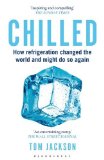Summary | Excerpt | Reviews | Beyond the Book | Readalikes | Genres & Themes | Author Bio

Critics' Opinion:
Readers' Opinion:
First Published:
Sep 2015, 272 pages
Paperback:
Oct 2016, 288 pages
 Book Reviewed by:
Book Reviewed by:
Poornima Apte
Buy This Book
The knowledge that they – the likes of Cornelius D rebbel, Robert Boyle and James Joule – revealed was to form the basis of thermodynamics, the field of physics that tackles the behaviour of energy. Martin Goldstein, an American chemist and author on the subject of thermodynamics, had it right when he wrote: 'Some people want to know how a refrigerator works. Others want to know the fate of the universe … The science that relates them is thermodynamics.'
A refrigerator is a 'heat pump', which on the face of it is perhaps an uninspiring term. However, dig a little deeper into the concept and it reveals something rather amazing – tiny acts of rebellion against the conformity of the universe. The idea of a 'heat sink' is perhaps a familiar one. Basically it means that the energy of a hot space is transferred to one that is less hot. So heat pours out of the Sun, warming objects around it – mostly the planets, including Earth. In turn Earth's heat energy dissipates into the growing emptiness of space, which is the ultimate 'heat sink'. This one-way travel is an unbreakable law of thermodynamics, but one that can be disrupted, albeit temporarily, by a 'heat pump'. A heat pump can push heat against the universal flow. In the case of a refrigerator, it is pushing heat out of the food and freezer compartments into the surroundings, and as a result everything inside gets colder.
Our planet alone, among the billions postulated to exist, is home to an army of heat pumps, machines that are working against the inexorable collapse of order into chaos. Now it is perhaps becoming clearer why palaeolithic man had little trouble torching a wooden stick, but had to wait several dozen millennia before he could put an ice-lolly on it.
The technology that could harness physical laws to create cold was far from an overnight sensation. It took 170 years to transform it from a prototype in 1750 to anything approaching a mass-market product. However, the demand for cold had raced ahead of the technology.
The storage of natural ice had been a niche practice for the wealthiest since antiquity, especially in Asia. As with so many other technologies, Eastern know-how was put to work in Renaissance Europe, so the nobility of Italy, France and Spain also had the luxury of chilled wines and iced desserts. Luxury was not all it was used for. In 1503, Cesare Borgia, the notorious leader of an army that had swept across swathes of southern Europe in the name of the Pope – Cesare was a bastard son of the incumbent – used his supply of ice for a less traditional purpose.
Cesare had already made his mark on history by that time. He is reputed to be the inspiration behind Niccolò Machiavelli's The Prince (1513), a handy guide on how to rule with terror and treachery, and he also appears as one of the bad guys in the Assassin's Creed games. Neither makes reference to his possibly unique experience with ice. Both he and his father, Pope Alexander VI, were struck down by a terrible fever – retold as a planned poisoning gone awry.
While the Pope opted for a thorough-going bleeding to combat the malady, Cesare's fever raged so strongly that he was immersed in a man-sized oil jar filled with iced water. It did the trick; Cesare survived to lie, cheat and murder for another 20 years – but the treatment is reported to have made all of his skin fall off (Pope Alexander died, and his body was so swollen by the disease that it had to be literally hammered into the coffin).
The medicinal virtues of cold were widely considered – although drinking too much cold water was also deemed a dangerous and unnatural act – but preservation of food was not regarded as a primary use for ice at first. The rise of icehouses across Europe was primarily due to a demand for chilled wines and dessert but the vogue grew for stocking them with sides of fresh meat and ripening fruits.
Excerpted from Chilled by Tom Jackson. Copyright © 2015 by Tom Jackson. Excerpted by permission of Bloomsbury USA. All rights reserved. No part of this excerpt may be reproduced or reprinted without permission in writing from the publisher.





The Flower Sisters
by Michelle Collins Anderson
From the new Fannie Flagg of the Ozarks, a richly-woven story of family, forgiveness, and reinvention.

The House on Biscayne Bay
by Chanel Cleeton
As death stalks a gothic mansion in Miami, the lives of two women intertwine as the past and present collide.

The Funeral Cryer by Wenyan Lu
Debut novelist Wenyan Lu brings us this witty yet profound story about one woman's midlife reawakening in contemporary rural China.
Your guide toexceptional books
BookBrowse seeks out and recommends the best in contemporary fiction and nonfiction—books that not only engage and entertain but also deepen our understanding of ourselves and the world around us.